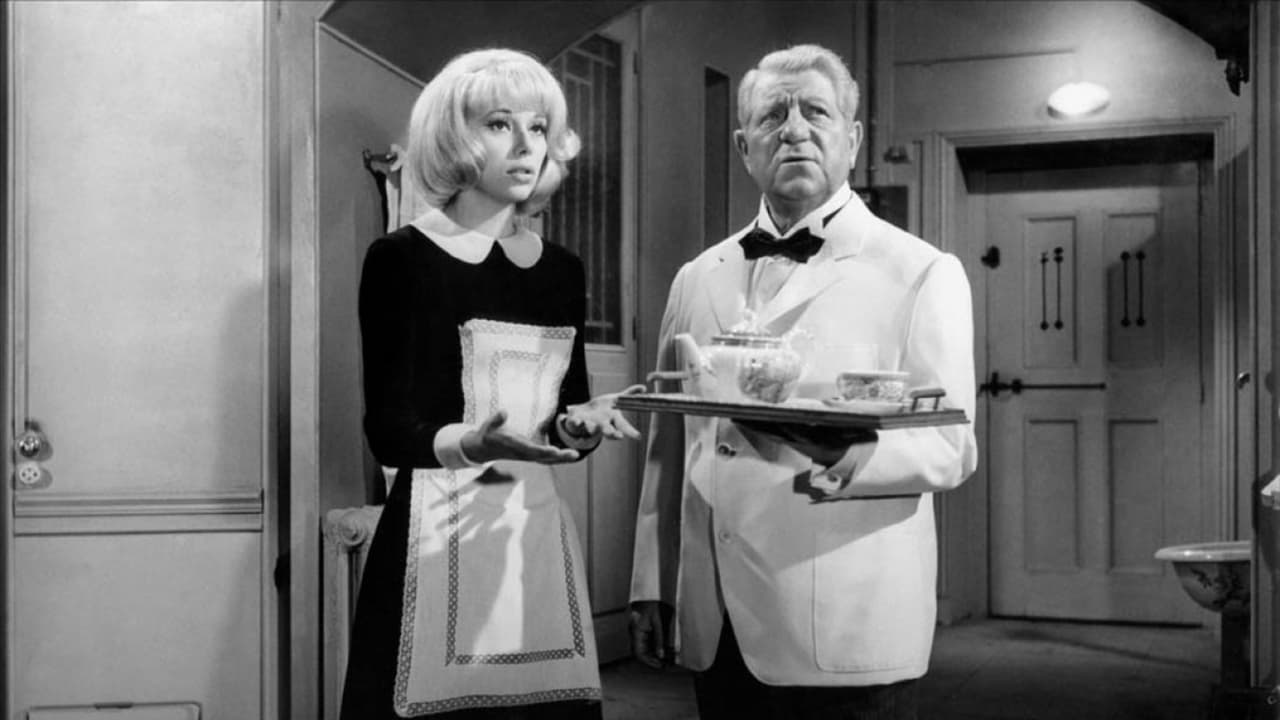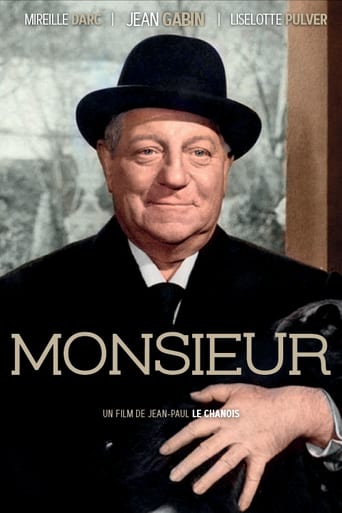LouHomey
From my favorite movies..
Mischa Redfern
I didn’t really have many expectations going into the movie (good or bad), but I actually really enjoyed it. I really liked the characters and the banter between them.
Clarissa Mora
The tone of this movie is interesting -- the stakes are both dramatic and high, but it's balanced with a lot of fun, tongue and cheek dialogue.
Brenda
The plot isn't so bad, but the pace of storytelling is too slow which makes people bored. Certain moments are so obvious and unnecessary for the main plot. I would've fast-forwarded those moments if it was an online streaming. The ending looks like implying a sequel, not sure if this movie will get one
Armand
because it is not a French comedy but a Gabin's film. because Philippe Noiret is adorable and Mireille Darc the same. because it has all the ingredients to be nice, seductive and little more than an easy film . because it represents the scene for Jean Gabin for remind a precise art who is not easy to ignore. a good director. an inspired cast without be the best but, with strong pillars, the result is far to be bad. a film about family , adventure and identities. and, sure, about Monsieur. the best part - the beginning. the end - useful for not ignore the memories about the lovely French comedies. a serious film despite the appearances. because it has charm and sensitivity and force of seduction. and that is all. see it !
dbdumonteil
At the time,Le Chanois was the New wavelet's favorite Bête Noire .One often forgets he began as a communist activist ("Le Temps Des Cerises") and gave a handful of excellent movies in the 1946-1952 era,the best of which remaining his wonderful" Ecole Buissonnière". A craftsman and a humanist at that ,his career is not as dismal as the N.V. clique claims.The sixties were his most mediocre period;he was wise enough to call it a day in 1966 (he died in 1985)."Monsieur" has some good moments ,particularly in Gabrielle Dorziat's scene asking Jean Lefevre for a dead body to make sure her son-in-law is dead and to latch onto his dough;Mireille Darc has spontaneity and charm going for her in her maid turned hooker turned maid again role ,which eventually ends up in a Cinderellaesque way .Gabin is Gabin but his part is weak :just compare to what Sacha Guitry did with Michel Simon in a similar subject in "La Vie D'Un Honnête Homme "(1952).Philippe Noiret is wasted and Liselotte Pulver gives a rather poor performance (to think that she was the heroine of Douglas Sirk's masterpiece " a time to love and a time to die" (1958)!)It was to be Gaby Morlay's last part (she died the same year) and she does seem the ghost of herself;One wishes she had left the screen on a high note,on the endearing "Fortunat" (1960)for instance.
Charlot47
Only one review? Let me add another, because the premise of a rich banker and a tart escaping their separate pasts to be butler and maid in a country house means that they can use their skills in the new job to comic effect but always risk exposure. The story is in fact not too well developed but that doesn't matter because the dialogue and acting are often fun.First, of course, we must place the immortal Jean Gabin who exercises his tremendous presence, dominating other characters by his intelligence and force of personality. When Suzanne as a whore warns him that her protectors are hard men, he merely says "But I am a banker" and outwits the dim thugs in no time. As butler, while cleaning the shoes he notes that the master uses the same bootmaker as the ex-King of Spain. Equal second to my mind come his frenetic employers, the two Bernardacs. He is the incomparable Philippe Noiret, trying to combine pompous businessman and father with passion for his new air hostess wife. She, the Swiss Liselotte Pulver, combines daytime adultery with evening drinking but always charmingly. The lovely Mireille Darc as the prostitute turned chambermaid Suzanne can only come fourth, because she is unfortunately given too little to do. Little contemporary touches recall a long gone era. In the girls' bedrooms pictures from magazines of contemporary pop stars are stuck up on the walls. And in Paris at that time to be chic one had to drive an English car, so we see posh Daimlers and Rovers, sporty Austin-Healeys and Jaguars, plus the ubiquitous Mini.
MARIO GAUCI
Jean Gabin had been one of France's biggest stars during the 1930s with several films for great directors such as Marcel Carne', Julien Duvivier and Jean Renoir; his later output wasn't anywhere near this level and apart from the odd title - Max Ophuls' LE PLAISIR (1952), Jacques Becker's TOUCHEZ PAS AU GRISBI (1954) or Renoir's own FRENCH CANCAN (1954), to mention the ones I've watched myself - the majority of these could be deemed fillers.Still, a good many of them have turned up from time to time on TV: I've missed a few and watched others - but, then, I'm most interested in the ones which fall into the thriller genre. This promised to be one such title and, sure enough, the first half is interesting as it deals with banker Gabin about to commit suicide after the death of his faithless wife but being dissuaded by a chance meeting with former maid Mireille Darc, who has herself fallen on hard times and become a hooker! As he had left a suicide note, his relatives eye his wealth greedily and even insinuate themselves in his vacant household (since Gabin finds it convenient to appear dead to the world!); however, he hitches up with Darc's criminal associates and decides to break into his own house (unbeknownst to the rest of the gang - in fact, he's only referred to as "Monsieur", hence the film's title) and rob the safe!! The second half, however, in which Gabin and Darc ostensibly present themselves to a rich household in the countryside as servants (in preparation for another heist) turns the film into a pleasant - and typically French - comedy of sexual manners, with Gabin covering up the female owner's escapades from husband Philippe Noiret (one of my favorite bits during this section is when Gabin is asked to pick her up from one such tryst after her car has broken down, and an old vicar turns up and helpfully - but cluelessly - suggests to them what might be wrong with the vehicle), while their son falls for Darc (whom Gabin is passing off as his own daughter!). While all this is undeniably entertaining, it jars with the earlier section as Gabin's accomplices are unaccountably removed from the picture - so that his decision to remain in Noiret's employ (other than the fact that he is being paid for his services and, being thought dead by his relatives and colleagues, won't be missed) is never explained! Even if older and plumper, Gabin's quietly authoritative screen presence is unmistakable - and the film also benefits from having the gorgeous Darc (best known for playing the female lead in Jean-Luc Godard's masterpiece WEEK-END [1967]) on board, as well as a cheerful score by Georges Van Parys.

